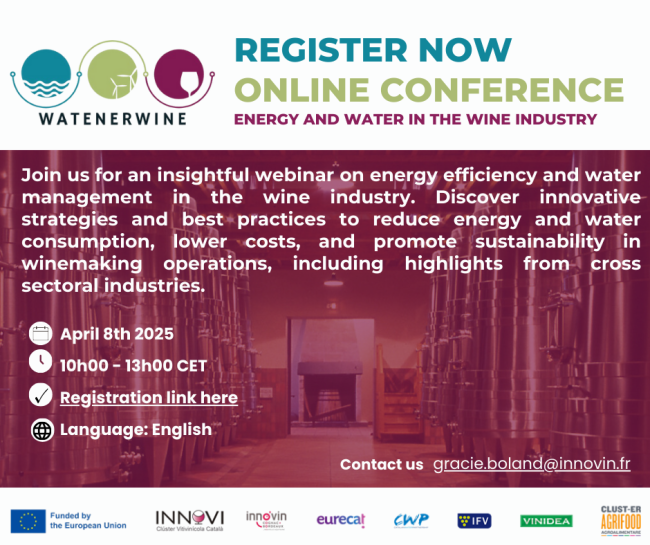
Description
Join us for an insightful webinar on energy efficiency and water management in the wine industry. Discover innovative strategies and best practices to reduce energy and water consumption, lower costs, and promote sustainability in winemaking operations, including highlights from cross sectoral industries.
More about the WatEnerWine Project: Water and Energy in the wine sector: transition towards a sustainable, efficient and resilient industry
Project financed by the call MP-COSME-2023-AGRICLUSTER.
The consortium of the project reflects different actors from the sustainable agri-food sector and includes: three agri-food clusters (INNOVI, INNO’VIN, CLUST-ER), two support organizations (CWP and VINIDEA), and two technological centers (EURECAT and IFV).
Background: The European wine industry is a significant contributor to the European economy. The weight of viticulture plays a more important role in France, Italy, Spain, and Portugal, as it is grown in nearly all regions of southern Europe. Wine production is an example of an activity where processing occurs on-site, thereby maintaining the added value in the production region.
Wine production is vital for rural areas as it contributes to: Quality tourism, Landscape preservation, Retention of permanent population
Continuing with the work of the European EPAWI project (COSME Project) and the Wine Innovation Collaboration Alliance (WICA), the global survey produced with the participation of over 600 producers and viticulturists defines the main challenges of the wine sector worldwide as follows:
Reduce energy use and improve energy efficiency for production by using less energy-intensive technologies with low carbon emissions.
Increase the use of renewable energy sources (e.g., solar, wind, sustainable biomass, coproducts).
Improve water efficiency.
Objectives: To support actions for the establishment of the “European Agri-food Sustainability Cluster Partnerships” focused on promoting (advancing and implementing) the adoption of resource efficiency technologies in the areas of energy and water by SMEs, specifically in energy efficiency, renewable energy, and water management and efficiency.
This general objective is structured into several specific objectives:
Create a network of clusters, business support organizations (BSOs), technological centers, and SMEs to promote the project's goal.
Improve the structures and capacities of EU clusters and BSOs to support SMEs in their transition towards sustainability.
Enhance the energy efficiency and water management of wineries to adopt actions and technologies.
Reduce greenhouse gas emissions and resource use.
Reduce operational costs.
Involve organizations in European sustainability initiatives.
Actions to be developed:
The project begins with mapping best practices related to water management, energy efficiency, and the use of renewable energy in the wine sector and other agri-food sectors. This compilation will be supported by data extracted from a global survey and analysis of various studies and scientific articles.